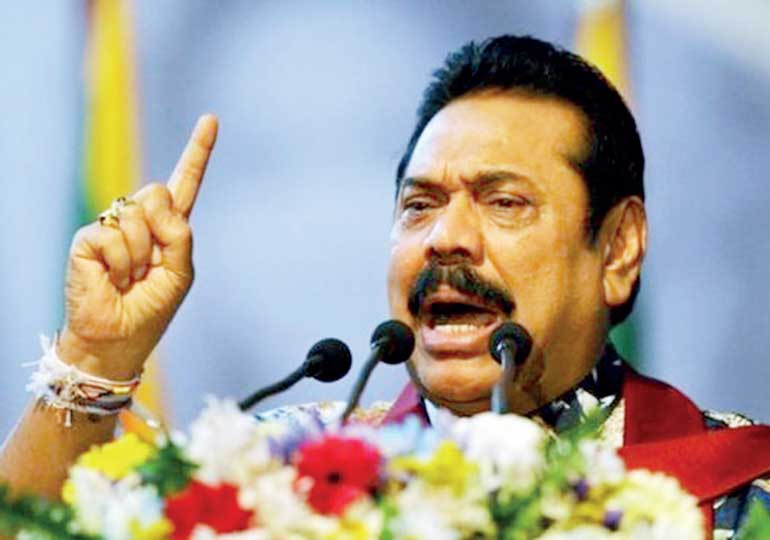Friday Feb 27, 2026
Friday Feb 27, 2026
Thursday, 17 November 2016 00:20 - - {{hitsCtrl.values.hits}}
 Former President and current Kurunegala District MP Mahinda Rajapaksa yesterday breathed fire in Parliament, rejecting all charges against him on foreign borrowing and assuring the nation that privatisation would not be tolerated by him.
Former President and current Kurunegala District MP Mahinda Rajapaksa yesterday breathed fire in Parliament, rejecting all charges against him on foreign borrowing and assuring the nation that privatisation would not be tolerated by him.
Joining the 4th allotted day on the 2nd reading debate of the Appropriation Bill 2017, MP Rajapaksa criticised the Maithripala-Wickremesinghe Government for driving the country towards an economic crisis, highlighting the foreign debt during his tenure as President.
“We agree with the Finance Minister with the fact that he presented a different budget, which is aimed at taxing, penalties, levies and selling State assets. It is nothing more than a traditional UNP budget and an extension of the regaining Sri Lanka of 2002. Hopefully you will remember how they started selling State properties and increase taxes. They sold almost 80 State properties but were unable to bring down debt. In 1977, the national debt was 68.6% of the GDP, by the time the UNP left in 1994, the national debt stood at 95% of the GDP. By the end of 2002, national debt went over 100% under Chandrika’s regime, even after the sale of insurance, telecom, and gas.”
According to Rajapaksa, his Government discontinued privatisation and reduced foreign debt. “We have a put a stop to privatisation during the period 2005–14. When I gave the country back in January 2015, debt was reduced to 70.4% of the GDP. By the end of 2015, the national debt had gone up to 76%. It could go up to 78% by the end of this year. Instead of strengthening the Central Bank the Government proposes to hand over the entire payment system to a private operator. More plans are being made to privatise many State assets. Chances are high that expressways, railway lines, and the Moragahakanda Project too could be privatised. It is unfortunate that a part of the Sri Lanka Freedom Party has joined this group,” he said.
“This is a budget which is degrading the local manufacturer. If loans are taken to repay debt, how can the debt keep increasing? Since January 2015, the Government has borrowed $ 3.6 m from international markets and another $ 1.5 m from the International Monetary Fund. In return, the Government managed to settle the temporary currency swap with India amounting to $ 1.2 m. But we have only borrowed a maximum of $ 1 m per annum,” he added.
Rejecting Government charges of evading book entries and hiding foreign borrowings during his presidency, Rajapaksa said: “At one time the Government was charging us for unwritten borrowings. If there are unrecorded debts, please reveal the names of the lenders. Even after heavy borrowings, the Government was unable to launch a national project of importance or take forward the programs we have planned before. It is a good proposal to give tablets to school children, but it is reported that the tablets promised for university students from the last budget are also pending. Even if they receive these, the increased Internet charges will prevent them from using them.”
“We have built almost all infrastructure facilities using international borrowings. So, it is unfair to sell national properties at much higher prices compared to the investments made. By selling the Hambantota Port, a monopoly will be created. Taxes applicable on tourism, telecommunication, construction and healthcare sectors were increased from 12% to 28%. Goods export tax increased from 12% to 14% and the services export tax increased to 12%. Many other trades and areas are taxed, damaging locals while encouraging foreign investors,” he said. (AH)